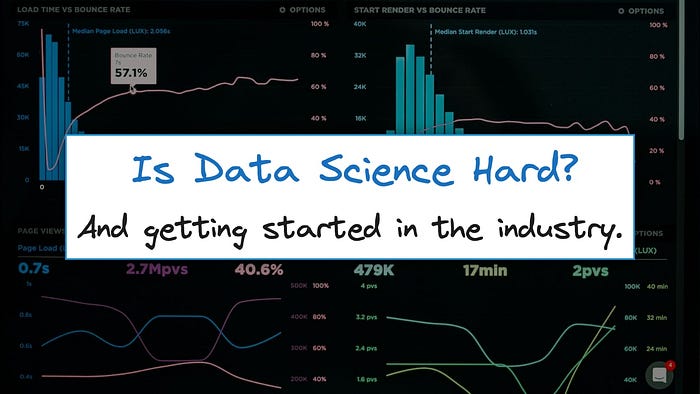Navigating the Challenges of a Data Science Career
Written on
Understanding the Difficulty of Data Science
In today's tech-driven world, data science has emerged as a pivotal force across various industries, including finance, healthcare, e-commerce, and environmental research. It promises to extract valuable insights from vast amounts of unstructured data. However, a prominent question arises:
Is data science really difficult?
The complexity of data science is subjective; what one individual finds challenging, another may view as straightforward. Nonetheless, data science necessitates a distinct combination of skills that span multiple disciplines, such as mathematics, computer science, and machine learning.
Knowledge is often described as power, and in the realm of data science, this power manifests in various forms. The core of data science lies in statistics and mathematics, which are essential for analyzing data, drawing insights, and making predictions. A proficient data scientist should be well-versed in programming languages like Python or R, which are vital for data manipulation and model creation.
Moreover, success in this field hinges not only on technical abilities but also on soft skills like critical thinking, effective communication, and a genuine curiosity. These attributes are crucial for converting raw data into actionable insights that can be effectively communicated to non-technical stakeholders, thus promoting data-driven decision-making.
How to Embark on a Career in Data Science
The journey into data science offers enticing prospects, making the effort to enter the field worthwhile. For newcomers, the path may initially appear overwhelming.
Where should one begin?
A common myth is that a PhD or advanced degree is necessary to kickstart a career in data science. While higher education can be advantageous, it is not mandatory. Numerous successful data scientists have launched their careers through online courses, coding boot camps, or self-directed learning. Demonstrating your ability to leverage data for real-world problem-solving is key, and a portfolio of your projects can often convey your capabilities more effectively than formal qualifications.
Considering the practical aspects of data science, let's examine its career potential. The demand for data scientists has skyrocketed and continues to grow. According to the U.S. Bureau of Labor Statistics, employment for data scientists is anticipated to increase by 36% between 2021 and 2031, significantly outpacing the average for all professions.
Additionally, data science is not just a flourishing sector — it is also lucrative. Reports indicate that the median salary for entry-level data scientists in the United States is around $124,000, with seasoned professionals earning approximately $151,000 on average as their skills and experience grow.
As the field evolves, it's essential to stay alert to the continuous changes in tools, methodologies, and best practices, which necessitate ongoing learning and adaptability.
Furthermore, data science is not a monolithic role. It is a diverse discipline encompassing various specialties, ranging from machine learning to data visualization. This diversity can lead to ambiguity regarding the specific responsibilities of data scientists, complicating the definition of a clear career trajectory.
If you are keen to start your journey in data science today, here’s a roadmap to guide you.
First and foremost, mathematics and statistics form the foundation of data science. Begin by familiarizing yourself with concepts such as linear algebra, calculus, probability, and statistics. Online platforms like Khan Academy and Coursera are excellent resources for getting started.
Next, choose a programming language, with Python being a popular choice due to its versatility, and dive into learning it. Numerous resources, including Codecademy, LeetCode, and YouTube tutorials, are available. However, don't just passively consume content — actively engage in coding, as hands-on experience is crucial for mastery.
Once you are comfortable with programming, it's time to explore data science-specific libraries. If you opted for Python, experiment with tools such as Pandas, NumPy, Matplotlib, and Scikit-learn. These libraries are essential for data manipulation, visualization, and developing machine learning models.
Machine learning plays a critical role in data science. Start by grasping the basics — supervised and unsupervised learning, common algorithms, and model training and validation. Andrew Ng's Coursera course on Machine Learning is a fantastic introduction.
Moreover, fostering collaboration, communication, and problem-solving skills is vital. Be ready to explain intricate concepts in simple terms and collaborate with cross-functional teams. Familiarizing yourself with Git and GitHub will also be beneficial for working alongside other developers.
The traditional path to data science often involves obtaining a formal degree, such as a bachelor’s or master’s in data science, computer science, or a related field. For instance, Western Governors University offers an online Data Analytics program, allowing students to earn a Master’s degree in data science for approximately $17,620 if completed in two years. This program provides comprehensive training in data science, covering statistics, calculus, programming, machine learning, and data visualization. Graduates emerge with a robust foundation of knowledge and skills necessary to pursue a successful career in this field.
Conclusion
It’s fair to acknowledge that data science can indeed be challenging — but there is nothing preventing you from succeeding. The field requires a diverse skill set, a commitment to lifelong learning, and the ability to adapt to an ever-changing landscape. However, the intellectual and financial rewards it offers make the effort worthwhile.
The most important takeaway is that a career in data science is more of a marathon than a sprint. It demands persistence, curiosity, and a passion for discovery. If you possess these qualities, then the challenges of data science are not obstacles but exciting opportunities on a fulfilling career path.
This video explores the harsh realities faced by data scientists, shedding light on the challenges and expectations in the field.
In this video, viewers gain insight into the day-to-day life of a data scientist and the skills required to thrive in this dynamic industry.
